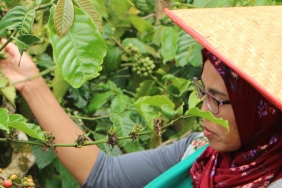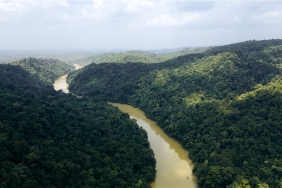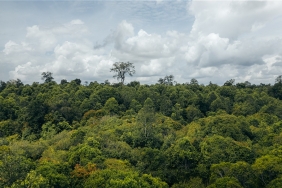THE STORY OF KANG OMA, THE FORMER HUNTER WHO BECOME A NATURE PROTECTOR
Changing a habit is not easy. Changing an attitude is also not an easy thing. The same thing happened to Kang Oma, one of the field school guides from Cegog Village, Rancapinang Village, Banten. Kang Oma has experienced it all, how difficult it is to accept new habits and accept changes in self-attitude.
Kang Oma is a young man who lives in Cegog Village, Racapinang Village. Rancapinang Village is one of the buffer villages of Ujung Kulon National Park (TNUK). Since he was young, Kang Oma has started farming and raising buffaloes to help his parents. The farmland owned by Kang Oma's family is very close to the Ujung Kulon National Park area. Kang Oma and his family have rarely used artificial fertilizers and pesticides in the management of their family's agricultural land, although they use artificial fertilizers and pesticides, they only use small amounts. The artificial fertilizer they often use is urea fertilizer, about 1 quintal for a land area of 3700 m2.
In 2017, WWF-Indonesia, Ujung Kulon Project started the School of Ecological Farming (SLPE) in Cegog Village. At that time, there were not many people who understood and understood the ecological-based farming system. Including Kang Oma. However, Kang Oma was very interested in learning about this ecological farming system. Finally, Kang Oma also participated in the activity starting from the socialization process, the selection of participants to officially become a SLPE participant facilitated by Kang Fajri from WWF Indonesia, Ujung Kulon Project.
The road taken by Kang Oma to be able to apply this new system was not easy. Kang Oma's family, especially his mother, had teased Kang Oma that with this ecological-based system, the results would definitely not be good because according to them without chemical pesticides the rice seeds would not be strong enough to withstand pest attacks and without artificial fertilizers, rice plants would not grow quickly and produce good grains.
Indeed, at the beginning of planting, Kang Oma's rice production decreased slightly, but Kang Oma was not disappointed and despair.
Now, Kang Oma is active as the head of the SLPE group and around the end of 2018 when WWF-Indonesia, Ujung Kulon Project started the Buffalo Livestock Management Field School (SLPTK) activities in Cegog Village, Kang Oma, who has always been a buffalo farmer, was immediately excited to participate in the SPTK activities. In the past, before Kang Oma became actively involved in SLPE and SLPTK activities, Kang Oma along with other residents living around the TNUK buffer zone did not know what could and could not be done in the National Park Area. Kang Oma along with his friends often conduct hunting activities in the TNUK area such as hunting pigs, birds, and bajing. They hunt these animals for consumption and entertainment.
After Kang Oma was busy with field school activities with other residents of Cegog Village, in addition to Kang Oma having a new activity so that he no longer remembers to hunt, Kang Oma also now understands the importance of protecting the TNUK area. Of course, Kang Oma's passion for hunting in the area did not just stop completely. It took him a while to slowly stop this bad habit as Kang Oma's understanding of the importance of preserving nature grew. With adult education applied by the field school, making participants including Kang Oma experience and find out for themselves so that the knowledge and understanding they get from the results of thinking and discovering themselves is what is really embedded in their minds and minds.
Now, Kang Oma is not only an actor for the ecological-based farming system but now Kang Oma and other friends are also field school guides who tirelessly invite their villagers to be able to implement ecological agriculture and also do not forget to remind their villagers how important it is to maintain the balance and sustainability of the Ujung Kulon National Park Buffer Zone. Kang Oma, who used to be shy and passive, now has the courage to express his opinions and experiences to his villagers. Currently, Kang Oma is also active as one of the mobilizers in Rancapinang Village to encourage villagers to do positive and non-destructive activities.
Kang Oma has understood that by protecting the area, they not only protect the flora and fauna but they also help maintain the balance of the ecosystem in their village. Hopefully in the future there will be other Kang Oma-Kang Oma who are very passionate in spreading the message of conservation.





